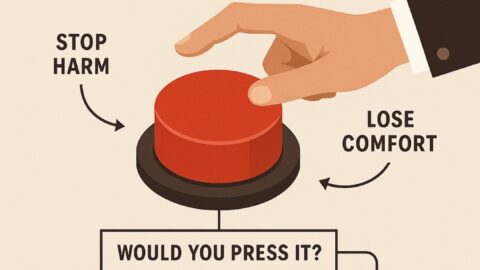“You are what you do, not what you say you’ll do.” – Carl Jung
This quote by Carl Jung, a renowned Swiss psychiatrist and psychoanalyst, emphasizes the fundamental truth that actions define a person far more than intentions, promises, or words ever could. It highlights the discrepancy between self-image and actual behavior, underscoring the importance of authenticity, accountability, and integrity.
Let’s explore this quote in depth.
The Power of Actions Over Words
A. Words Are Easy; Actions Require Commitment
- It’s easy to declare intentions, make promises, or talk about plans.
- Actions, on the other hand, require effort, sacrifice, and follow-through.
- Promises without actions are empty; they create a gap between what is said and what is real.
Example:
- A friend who consistently promises to help you move but never shows up reveals their true reliability through inaction, despite their words.
B. Actions Reflect True Priorities
- What we choose to spend our time, energy, and resources on reveals what we truly value.
- Someone might say they value family, but if they consistently prioritize work or hobbies over family time, their actions tell a different story.
Key Insight:
Actions reveal authentic priorities, while words often reveal aspirational priorities—things we wish were true about ourselves.
Identity is Shaped by Behavior
A. Habits Define Who You Are
- Repeated actions form habits, and habits ultimately shape character and identity.
- Who you are isn’t defined by occasional grand gestures but by your consistent behaviors over time.
Example:
- A person who repeatedly lies isn’t just someone who told a lie—they are a liar.
- Conversely, someone who consistently shows kindness isn’t just someone who did kind things—they are a kind person.
B. Intention Without Action is Self-Deception
- Continually saying you’ll do something without ever following through creates cognitive dissonance—a conflict between what you believe about yourself and what your actions demonstrate.
- Over time, this can damage self-trust and confidence.
Example:
- Someone who says they’ll start going to the gym but never goes begins to feel frustrated with themselves, creating a cycle of guilt and diminished self-esteem.
Integrity and Authenticity
A. Walking the Talk
- Integrity means alignment between words, actions, and values.
- People with integrity don’t just say what they’ll do—they actually do it, even when it’s inconvenient or difficult.
Example:
- A leader who promises transparency but withholds key information lacks integrity.
- A leader who consistently communicates openly builds trust.
B. Trust is Built on Actions, Not Promises
- People trust actions far more than they trust words.
- Consistency in behavior builds credibility, while inconsistency erodes trust.
Key Insight:
Authenticity comes from being true to your word and following through with actions, even when no one is watching.
The Gap Between Self-Perception and Reality
A. The Comfort of Words
- Talking about goals, dreams, and promises can give a temporary sense of accomplishment—as if speaking them makes them real.
- But words without action are just illusions; they create a false sense of progress.
Example:
- Someone might repeatedly talk about writing a novel but never sit down to actually write. Their self-perception as a “writer” becomes a hollow identity.
B. Bridging the Gap
- Self-awareness is crucial to recognize the discrepancy between words and actions.
- Change starts with small, consistent steps, not grand declarations.
Real-World Applications of the Quote
A. In Leadership
- Effective leaders lead by example, not empty promises.
- Teams follow leaders whose actions reflect their values, not just their words.
B. In Relationships
- Saying “I love you” is meaningful, but showing love through actions—like support, time, and effort—is what truly communicates love.
- Promises in relationships mean little if they aren’t backed by consistent action.
C. In Personal Development
- Goals are achieved through consistent effort, not by just declaring them.
- Dreams stay dreams unless they’re translated into tangible steps.
Bridging the Divide Between Words and Actions
A. Start Small
- Make promises you can keep, and follow through on them consistently.
B. Create Accountability
- Share your goals with people who will hold you accountable.
C. Reflect Regularly
- Take time to evaluate your actions versus your words and adjust accordingly.
D. Embrace Discomfort
- Taking action often means stepping out of your comfort zone.
Why This Matters for Personal Growth
- Consistency between what you say and what you do builds self-respect and confidence.
- Over time, actions compound to create lasting change and define your legacy.
- People who act on their words develop a reputation for reliability, integrity, and authenticity.
Final Reflection
Carl Jung’s quote is a call to accountability and self-awareness.
- Who you are isn’t in your intentions, your words, or your promises.
- Who you are is revealed in your actions, in the steps you take every single day.
In short:
Your actions are your truth. Your behavior is your legacy. Speak less, act more, and let your actions tell your story.







